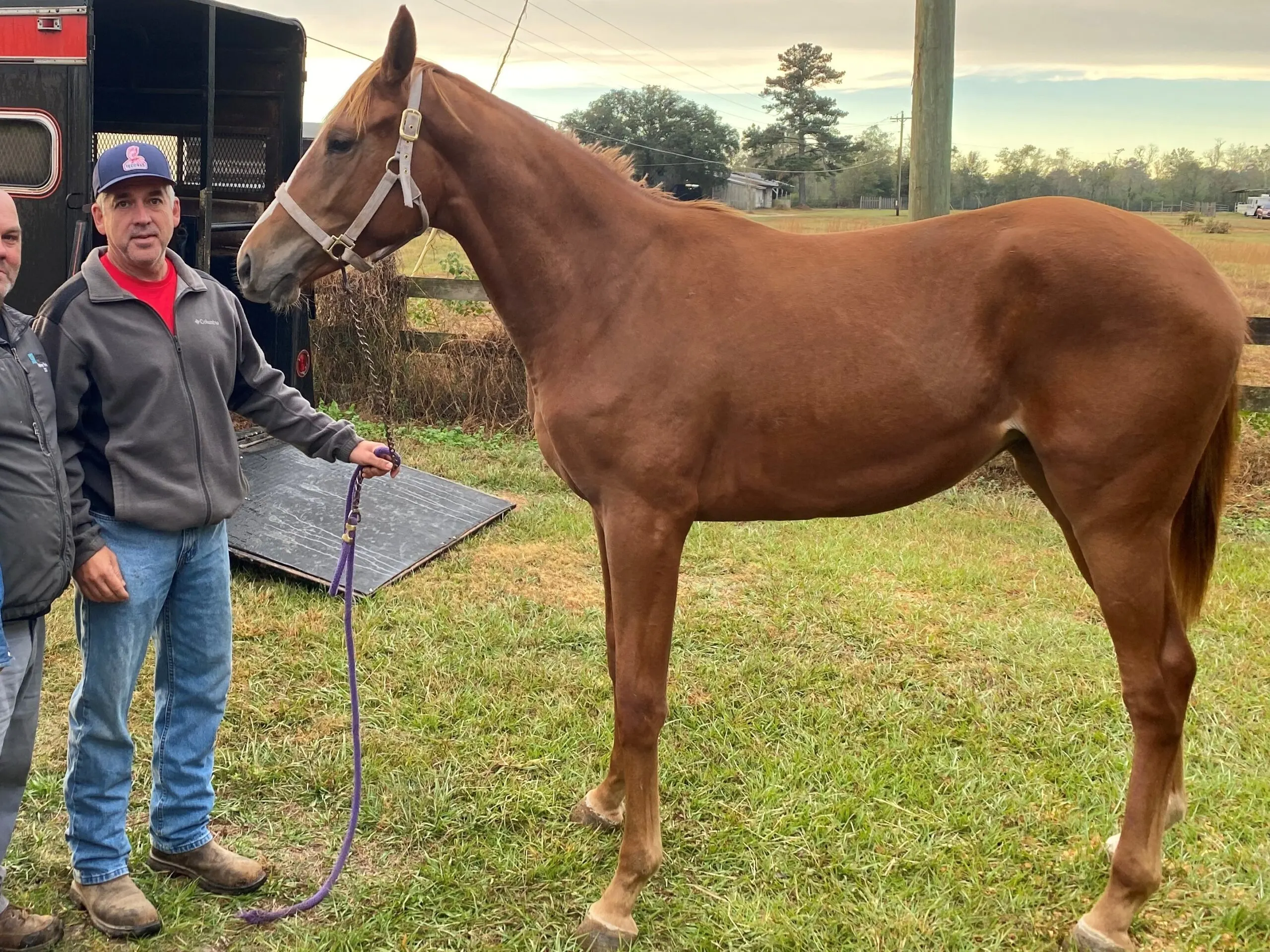Last updated: April 10, 2024
The Thoroughbred Winning Brew holds the Guinness World Record for speed, but did you know Quarter horses can reach up to 55 mph? Discover the exhilarating world of the fastest equine athletes with me, a racehorse owner with over 25 years of experience and author of two books on horses.
This article delves into the remarkable speeds of various horse breeds and explores the traits that make them fast. Join me on a journey through the world of the fastest horses, from the renowned Thoroughbreds and Quarter horses to the enduring Arabians.
Fastest Horses in Racing: Speed Records

Horse racing has a rich history of breathtaking speed records. These milestones not only mark the achievements of individual horses but also reflect the evolution of the sport itself.
Notable Speed Records
- Winning Brew’s Unmatched Pace: Winning Brew, a Thoroughbred, set an unbeatable record in 2008, reaching a speed of 43.97 mph. This record, recognized by the Guinness World Records, remains a high-water mark in horse racing.
- Secretariat’s Legendary Triple Crown: In 1973, Secretariat, a name synonymous with speed, won the Kentucky Derby with a time of 1:59 2/5, a record that still stands. His Belmont Stakes victory by an incredible 31 lengths is a feat yet to be matched.
- Black Caviar’s Undefeated Streak: Australian sprinter Black Caviar retired undefeated in 25 races, a testament to consistent high-speed performance and resilience.
- Dr. Fager: In 1968, Dr. Fager set a world record for the mile on dirt, clocking in an impressive time of 1:32 1/5 while carrying 134 pounds. This performance showcased his extraordinary speed and highlighted his strength and stamina. Dr. Fager’s record is one of the fastest and most resilient horses in racing history. His records stood for 30 years.
The Thrill of Speed
The quest for speed in horse racing is not just about records; it’s about the thrill, the strategy, and the heart-stopping moments that define the sport. Each record is a story of dedication, skill, and, sometimes, a touch of magic.
The Fastest Horse Breeds
Thoroughbreds

- Record Holder: Winning Brew, a Thoroughbred, holds the Guinness World Record for the fastest speed of a racehorse, clocking in at an astonishing 43.97 mph.
- Breed Overview: Thoroughbreds are renowned for their agility and speed and are primarily bred for racing. They are a symbol of speed and stamina in the horse racing world.
Quarter Horses
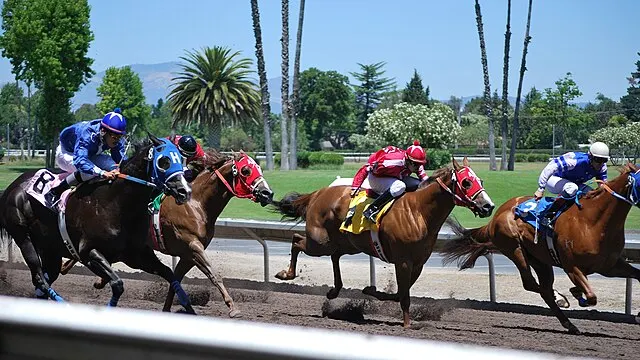
- Impressive Speeds: Known for incredible bursts of speed, Quarter Horses can reach up to 55 mph. They excel in short-distance sprints, often dominating races up to a quarter mile.
- Breed Characteristics: Quarter Horses are not just fast; they are also known for their versatility and are used in various equestrian disciplines, including rodeo events.
Comparing Speed Across Horse Breeds

Thoroughbreds: The Mile Runners
- Speed: Known for impressive speeds, typically around 40-45 mph.
- Racing Distances: Excel in races ranging from 1 mile to 1.5 miles, showcasing speed and endurance.
- Notable Record: Winning Brew holds the record for the fastest speed of a racehorse at 43.97 mph.
Quarter Horses: The Sprint Specialists
- Speed: Famous for explosive acceleration, reaching up to 55 mph in short distances.
- Racing Distances: Specialize in short sprints, often less than a quarter-mile, demonstrating unmatched quickness.
- Unique Trait: Their ability to rapidly accelerate from a standstill.
Arabians: The Endurance Experts

- Endurance: Not as fast as Thoroughbreds or Quarter Horses, but celebrated for incredible endurance.
- Endurance Races: Can maintain a steady speed of about 20-30 mph over long distances, excelling in endurance races up to 100 miles.
- Physiological Advantage: Larger lungs and a unique muscle composition aid their stamina.
Comparative Analysis
- Thoroughbreds vs. Quarter Horses: Thoroughbreds shine in longer distances, while Quarter Horses excel in quick, intense bursts.
- Arabians in the Mix: Arabians may not compete in sheer speed but are unmatched in endurance, which is ideal for long-distance competitions.
Here is a Comparison Table of the Fastest Horse Breeds:
| Breed | Top Speed (mph) | Key Traits |
|---|---|---|
| Thoroughbred | 43.97 (Winning Brew) | Lean, muscular build; high stamina; endurance racing |
| Quarter Horse | 55 | Explosive speed; muscular build; short-distance racing |
| American Paint Horse | 40+ | Colorful coat patterns; versatile; strong and intelligent |
| Appaloosa | 41 | Spotted coat; endurance; versatility in various disciplines |
| Standardbred | 30+ | Strong; good temperament; endurance; harness racing |
Discovering the Speed of Racehorses: Genetics to Training
Racehorses captivate us with their incredible speed. Let’s dive into what makes these equine athletes the fastest on the track, from their genetic blueprint to their rigorous training regimes.
The Genetic Edge
Racehorses inherit speed. Selective breeding has fine-tuned their genetic makeup, emphasizing traits like muscle composition and cardiovascular efficiency for peak performance.
- Selective Breeding: Thoroughbreds and Quarter Horses are bred for speed, focusing on traits that enhance their racing capabilities. Learn about breeding strategies.
- Inherited Speed: Lineage plays a crucial role. Breeders choose parents with top-speed records, aiming to produce even faster offspring. Explore racehorse pedigrees.
A pivotal study reveals how specific genetic markers, particularly the myostatin gene, are closely associated with racing performance in Thoroughbreds, determining their predisposition towards sprinting or endurance. Read the study on the genetic basis for speed.
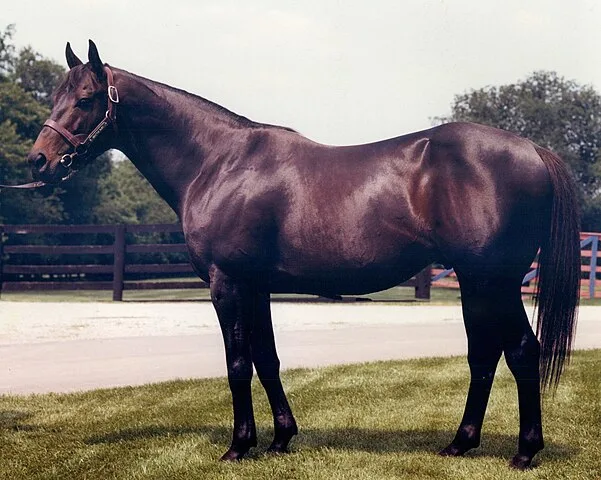
Physiological Superiority
A racehorse’s body is a marvel of natural engineering, designed for explosive speed and enduring stamina.
- Muscle Power: Fast-twitch muscle fibers provide the explosive speed needed in races.
- Heart and Health: A larger heart pumps more blood, fueling muscles with oxygen for sustained speed.
- Agile Build: Their lean, muscular structure and long legs are ideal for rapid movements.
Understanding the physiological traits contributing to a horse’s racing speed, such as muscle composition and cardiovascular efficiency, offers insights into these animals’ natural capabilities. Explore the factors influencing horse speed.
Training for Excellence
To improve racehorse speed, trainers use interval training, mixing high-speed runs with slower recovery periods. This boosts cardiovascular fitness. Swimming and treadmill exercises build strength and prevent injuries, which is crucial for horse wellness.
Technology like heart rate monitors and GPS trackers allows for personalized training plans, optimizing each horse’s performance and health. Together, these methods ensure that a horse reaches its speed potential safely, underlining the importance of a tailored approach in racehorse training.

Evolution and Innovation
Over centuries, Thoroughbreds and Quarter Horses have evolved, becoming faster and more agile. Technological advancements in veterinary medicine and training have further enhanced their natural speed.
Maximizing Horse Speed: The Role of Training and Care
As a racehorse owner with over 25 years of experience, I’ve seen firsthand how training and care impact a horse’s speed. Customized training programs, proper nutrition, and understanding each horse’s unique needs are crucial for their performance.
- Training Techniques: Incorporating interval training and agility exercises tailored to each horse’s needs can help increase its speed.
- Horse Care: Balanced diets and regular health check-ups ensure optimal performance.
- Understanding Each Horse: Observing and adapting to a horse’s behavior and reactions during training sessions is key.
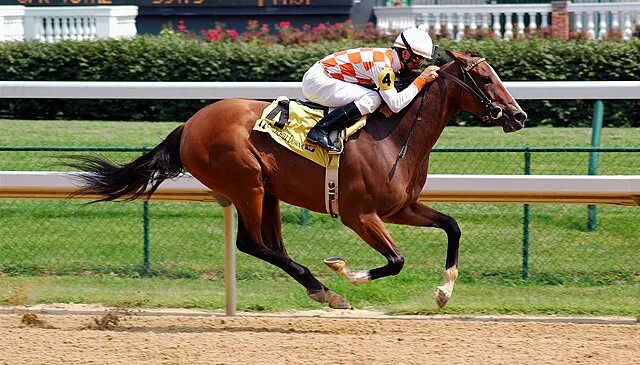
The fastest racehorses are a product of meticulous genetic selection, advanced training techniques, and comprehensive care. By understanding and nurturing these aspects, we continue to witness the awe-inspiring speed of these magnificent animals on racetracks worldwide.

FAQ
What is the fastest speed ever recorded by a racehorse?
The fastest speed recorded by a racehorse is 43.97 mph, achieved by the Thoroughbred Winning Brew.
Can the weight a horse carries affect its racing speed?
Yes, the weight a horse carries can significantly impact its speed. Lighter horses generally achieve higher speeds.
Could Seabiscuit have beaten Secretariat?
Although Seabiscuit was a great racehorse with amazing heart and stamina, it’s doubtful he could beat Secretariat in a race at any length. Secretariat could come off the pace or run from the front, traits that make Secretariat great.
Who was faster, Phar Lap or Secretariat?
Secretariat ran faster than Phar Lap over the same distance, but there is a caveat: Phar Lap carried heavier weight. If the two were to race under the same conditions, it would be difficult to predict the winner.
How does the racing surface impact a horse’s performance?
The racing surface plays a significant role in a horse’s performance. A firm, level track is ideal for achieving maximum speed.
Why are Arabians noted for endurance rather than speed?
Arabians are celebrated for their endurance. Thanks to their larger lungs and unique muscle composition, they can maintain steady speeds over long distances.
How important is stride length and frequency in horse racing?
Stride length and frequency are paramount in horse racing. Longer strides cover more ground, while higher stride rates increase leg movement speed, contributing to overall speed.
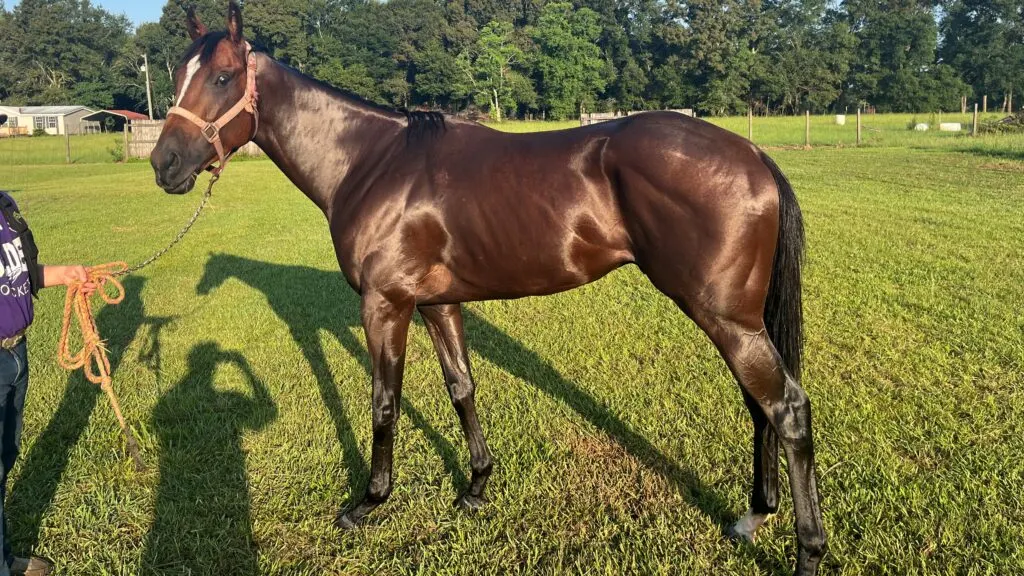
Conclusion: The Essence of Horse Speed
In horse racing, speed shows more than just how fast a horse can run; it’s about their natural talent, careful breeding, and detailed training. Thoroughbreds are known for long races, Quarter Horses for quick sprints, and Arabians for long-distance endurance.
The right training and a close relationship between the horse and trainer are crucial. As horse racing evolves with new technology and science, we look forward to seeing even faster horses in the future.

Let’s Talk About Fast Horses
We’d love to hear your thoughts and stories! Has anything surprising happened to you in the world of horse racing, especially related to speed? Maybe you have a favorite racehorse that’s close to your heart. Share your experiences and insights with us. Your stories add to our community and help us all appreciate the excitement of horse racing even more.
List of Authorities
- Guinness World Records – The definitive record keeper for the fastest racehorse speeds, including the record held by Winning Brew.
- The Jockey Club – An authoritative source for Thoroughbred racing and breeding statistics, including the legendary achievements of horses like Secretariat.
- American Quarter Horse Association (AQHA) – Offers comprehensive insights into Quarter Horses, detailing speed records and the breed’s significant contributions to horse racing.
- National Museum of Racing and Hall of Fame – Provides in-depth histories and achievements of racehorses, including the iconic Triple Crown victory by Secretariat.
- BloodHorse – A premier source for Thoroughbred racing, breeding, and sales, featuring extensive articles on racehorses and their speed records.
- Arabian Horse Association (AHA) – The official organization for Arabian horses in North America, highlighting Arabian horse racing, breeding, and competitions.
- Cardiovascular Adaptations in Thoroughbred Racehorses: Cardiovascular adaptations are key to the superior performance of racehorses, enabling them to sustain high speeds over distances, showcasing the remarkable endurance of these athletes.
- The Role of Muscle Fiber Types in Horse Racing Performance: The composition of muscle fibers significantly affects a horse’s speed and endurance, with different types of fibers contributing to various aspects of racing performance.
Meet Miles Henry
An avid equestrian and seasoned racehorse owner, Miles Henry brings his extensive experience to the equine world, proudly associating with the AQHA, The Jockey Club, and various other equine organizations. Beyond the racetrack, Miles is an accomplished author, having published various books about horses, and is a recognized authority in the field, with his work cited in multiple publications.
🔗 Connect with Miles:
Twitter
Facebook
YouTube: Check out race highlights, horse care tips, and more!

